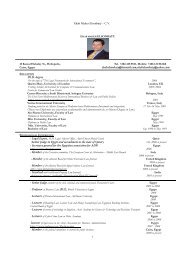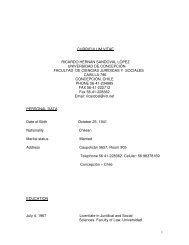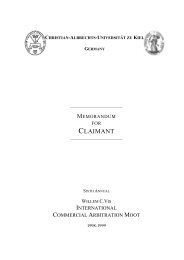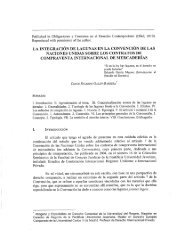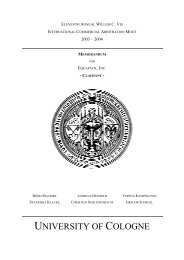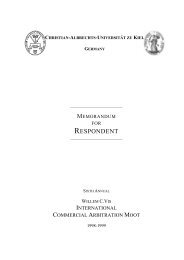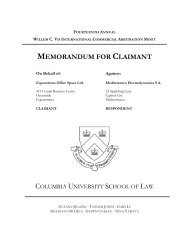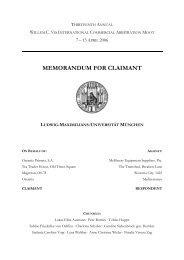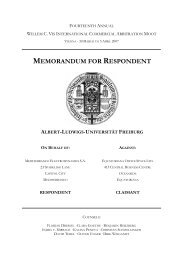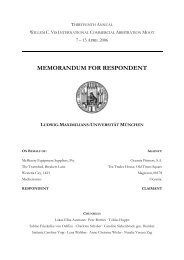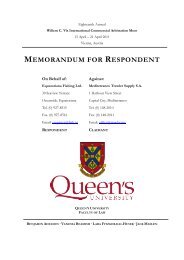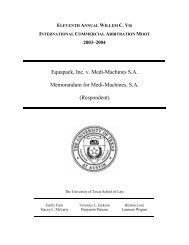UNIVERSITY OF FREIBURG - CISG Database
UNIVERSITY OF FREIBURG - CISG Database
UNIVERSITY OF FREIBURG - CISG Database
Create successful ePaper yourself
Turn your PDF publications into a flip-book with our unique Google optimized e-Paper software.
ALBERT LUDWIG <strong>UNIVERSITY</strong> <strong>OF</strong> <strong>FREIBURG</strong><br />
I. Art. 19(2) UNCITRAL Model Law Confers Competence on the Tribunal to Exclude<br />
a Legal Representative<br />
10 The Tribunal’s competence to remove a legal representative is conferred upon the Tribunal by<br />
Art. 19(2) UNCITRAL Model Law. According to this provision, a tribunal may “conduct the<br />
arbitration in such manner as it considers appropriate”, provided that the parties did not agree<br />
otherwise. In order to be able to do so, the Tribunal is equipped with a wide discretion<br />
[Analytical Commentary, Art. 19, para. 1; Hußlein-Stich, p. 109; UNCITRAL Secretariat<br />
Explanatory Note, para. 35]. Consequently, the Tribunal’s competence to remove a legal<br />
representative can be derived from Art. 19(2) UNCITRAL Model Law. General principles of<br />
arbitration call for such a competence (1), which is neither barred by the CIETAC Rules nor<br />
by Art. 18 UNCITRAL Model Law (2).<br />
1. General Principles of Arbitration Call for a Discretionary Competence to Remove A<br />
Legal Representative, Arising Out of Art. 19(2) UNCITRAL Model Law<br />
11 Taking into account considerations of efficiency, prevention of abuse of rights, party<br />
autonomy and fairness, Art. 19(2) UNCITRAL Model Law must be understood as granting a<br />
competence to remove a legal representative.<br />
12 First, the principle of efficiency militates in favour of such a competence. Efficiency is<br />
one of the most significant traits of international arbitration [Redfern/Hunter, para. 1-01;<br />
Fouchard/Gaillard/Goldman, para. 1]. Efficiency requires a tribunal to protect the procedural<br />
agreements made between the parties. Usually, an arbitrator is appointed after the parties have<br />
chosen their legal representatives. If in such a case the impartiality of the arbitrator is in<br />
doubt, the most efficient approach is to challenge the arbitrator in question. However, when a<br />
legal representative with a relationship to an arbitrator is added to one party’s legal team<br />
subsequent to the formation of the tribunal, the most efficient approach is to challenge that<br />
legal representative directly. Therefore, the principle of efficiency requires the possibility to<br />
challenge a legal representative [Waincymer, pp. 612, 613].<br />
13 Second, the tribunal’s competence to exclude a legal representative prevents abuse of the<br />
right of free choice of counsel. If a tribunal was unable to disqualify counsel, a party would<br />
always be free to add a new legal representative to its team in order to trigger the other party<br />
to challenge an arbitrator. One party would have the opportunity to get rid of any undesired<br />
arbitrator. In order to prevent such abuse, a tribunal must have the competence to exclude<br />
counsel.<br />
6



